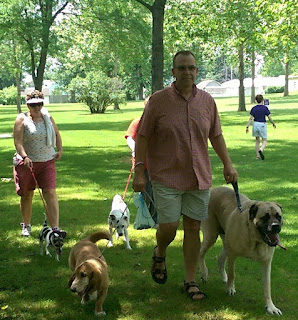It’s a sad
fact of life that sometimes things don’t turn out the way you want. This definitely applies to dog
ownership. Maybe you had unrealistic expectations
for your dog or made a poor choice of breeds for the life you lead. Maybe you didn’t realize how much training a
new dog needs. Maybe you forgot how much
trouble puppies can get into. Whatever
the reason, sometimes “perfect” just isn’t going to happen – at least not right
away.
I have many
clients whose dogs don’t behave the way they expected them to. Sometimes the fix is fairly simple – owner
education, increased exercise, training, and maybe a bit of behavior
modification. Sometimes it’s not so
simple. A frequent problem is that the
client simply chose the wrong breed for his or her living situation. The
dog is too big, too active, or too strong for the owner, or the breed is not
known for being easy to train and socialize.
My goal as a trainer is help the owner be happy with the dog he or she
has by teaching ways to deal with challenges that come up, and to help find
ways for the dog to lead a happy life.
Too many
people choose their dogs for the wrong reasons.
They felt sorry for a puppy in a pet store or flea market and brought it
home, not thinking about what kind of life they could offer this dog. Or they bought it on impulse. They chose a breed because of its appearance
and image or because it’s trendy, not knowing how much work they would have to
put in to make it a satisfactory pet.
They chose a dog requiring large amounts of exercise or work daily to
keep it sane, even though their schedules would not allow for this.
The good
news is that owners can usually make things work if they’re willing to take on
a long-term commitment. If the problem
is the dog’s need for more exercise than you can give it, check out a good
doggy daycare facility. Try an Agility
class or other active dog sport. Hire a
responsible kid to walk or run the dog daily.
There are ways
for “workaholic” dogs – those who need jobs - to be great pets. There are interactive toys are on the market
that will allow a dog to “hunt” for treats or work puzzles with his snout and
paws to get rewards. They can also be
taught to do household jobs such as putting away their toys or carrying things
for the owner. They thrive on training and take well to learning skills and
tricks. Creativity will help the owner come
up with meaningful work for these dogs.
There is
even hope for the imp-puppy from Hell who chews everything, bites hands, soils
carpets, tries to herd the kids, guards its toys, and makes you question why
you keep him. Learn the tools of the
trade for “civilizing” young puppies. Understand
that the solution to most puppy problems is closer supervision.
Gently teach him limits – no chewing, biting,
digging, etc. Teach him to rest quietly
in a crate or cage with a special toy or chewy for short periods when you need a time out. Patience is crucial because - training or not
- puppies are a handful. Age will solve
a lot of problems, along with a little work.
If the
situation involves one of the “image” breeds (Rottweilers, Bully breeds,
Mastiffs, etc.) a of training and socialization is absolutely required. They can be wonderful pets, but their owners
must be prepared for the responsibility of owning large, powerful animals. If the choice was a high-energy “Doodle” or
terrier, there may not be such a thing as too much exercise for the dog. They’re smart, too, and if they aren’t
adequately trained they’ll use those awesome brains on something that might not
make you happy.
In short, most
problems with dogs can be resolved. But
solutions don’t come without work. If
you absolutely must have perfection, maybe a stuffed toy might
have been a better choice, but they’re not near as much fun as the real thing.
Dorothy Miner is a long-time dog
obedience and tracking instructor, judge of canine events, and author. She teaches weekly classes for the Allen
Oakwood Correctional Institution’s PETS Program and provides training and
consultation under the banner of “Sidekicks” and “Training for Dogs and Their
People.”
